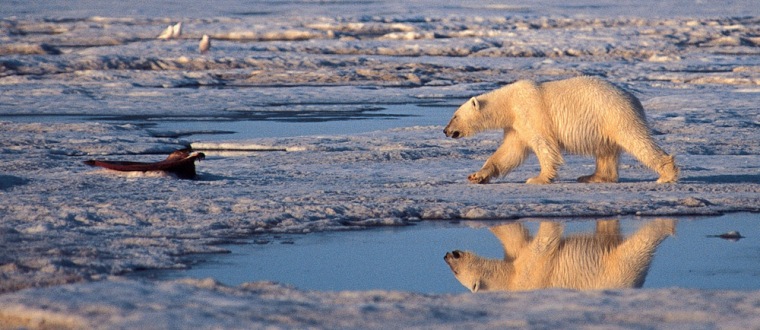A federal judge has ordered the Interior Department to decide within 16 days whether polar bears should be listed as a threatened species because of global warming.
U.S. District Judge Claudia Wilken agreed with conservation groups that the department missed a Jan. 9 deadline for a decision. She rejected a government request for a further delay and ordered it to act by May 15.
"Defendants have been in violation of the law requiring them to publish the listing determination for nearly 120 days," the judge, based in Oakland, Calif., wrote in a decision issued late Monday. "Other than the general complexity of finalizing the rule, Defendants offer no specific facts that would justify the delay, much less further delay."
Allowing more time would violate the Endangered Species Act and congressional intent that time was of the essence in listing threatened species, Wilken wrote.
The ruling is a victory for conservation groups that claim the Bush administration has delayed a polar bear decision to avoid addressing global warming and to avoid roadblocks to development such as the transfer of offshore petroleum leases in the Chukchi Sea off Alaska's northwest coast to oil company bidders.
"We hope that this decision marks the end of the Bush administration's delays and denial so that immediate action may be taken to protect polar bears from extinction," Greenpeace representative Melanie Duchin said in a statement.
Impact beyond Alaska?
A decision to list polar bears due to global warming could trigger a recovery plan with consequences beyond Alaska. Opponents fear it would subject new power plants and other development projects to federal review if they generate greenhouse gasses that add to warming in the Arctic.
A spokesman for the Interior Department said Tuesday the decision was being reviewed.
“We will evaluate the legal options and will decide the appropriate course of action,” said Shane Wolfe in an e-mail statement.
Assistant Interior Secretary Lyle Laverty has said the department needed until June 30 to complete a legal and policy review of the proposed listing.
Kassie Siegel of the Center for Biological Diversity, the lead author of the petition submitted in 2005, called the judge's order a huge victory, despite not knowing whether polar bears ultimately will be listed.
"It means that whatever political interference going on right now is going to be short-circuited," she said. "The politicians and the bureaucrats in Washington, D.C., are going to have to stop interfering with the decision and get it out the door."
The law requires a decision based on science, she said, and science shows the Arctic is thawing.
"The science is perfectly clear. There's no dispute. The polar bear is an endangered species," she said.
Initial December decision to list
In response to the petition filed in 2005, the Fish and Wildlife Service proposed in December 2006 that polar bears be listed as threatened under the Endangered Species Act because of the loss of their primary habitat, Arctic sea ice.
Summer sea ice shrank last year to a record low, about 1.65 million square miles in September, nearly 40 percent less ice than the long-term average between 1979 and 2000. Some climate models have predicted the Arctic will be free of summer sea ice by 2030.
A report by the U.S. Geological Survey said two-thirds of the world’s polar bears — some 16,000 — could be gone by 2050 if predictions about melting sea ice hold true.
A decision on the proposed listing was due Jan. 9, but Fish and Wildlife Service Director Dale Hall said in January that a delay was needed to make sure it came in a form easily understood. He promised a decision within a month, but that deadline also passed and the Center for Biological Diversity, the Natural Resources Defense Council and Greenpeace sued in March.
This is the first time global warming has been a factor in proposing a threatened status for any U.S. species.
Drilling battle
Until the U.S. government issues its decision on polar bears’ status under the Endangered Species Act, there should be no more oil and gas development in the Arctic bear’s habitat, according to the environmental law group Earthjustice.
Earthjustice, which was not involved in the current polar bear lawsuit, is proceeding with a separate suit challenging the Bush administration’s sale of oil and gas development rights in the Chukchi Sea off the Alaskan coast, a prime polar bear area.
During the first delay in issuing the polar bear decision, the Interior Department sold oil and gas rights on February 6 across some 29.7 million acres in the Chukchi Sea for a record $2.66 billion — about four times what the government expected to get.
“Only after deciding what level of protection polar bears warrant can informed decisions be made about how, where and when oil and gas development might go forward in polar bear habitat,” the group’s Erik Grafe said in a statement.
Interior Department officials have acknowledged that the science on the polar bear’s future is not in doubt but have said that any plan to remove the threat to the animals’ existence would be complicated, since climate change is a global phenomenon rather than a particular limited area with a specific problem.
In Canada, where two-thirds of the world’s polar bears live, an advisory panel — the Committee on the Status of Endangered Wildlife — said last Friday that the polar bear is of “special concern” but is not endangered or threatened with extinction.
